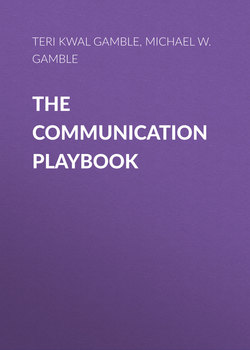Читать книгу The Communication Playbook - Teri Kwal Gamble - Страница 148
На сайте Литреса книга снята с продажи.
We Exhibit the Behaviors of a Lazy Perceiver
ОглавлениеA stereotype is a generalization about people, places, or events that many members of a society hold. The term stereotype is derived from an old printing practice, a shortcut in which the typesetter repeatedly used the same type to print a text. Metaphorically, when we stereotype, we repeatedly use the same thoughts or fixed mental images to “print” the same judgment about someone over and over again. We apply the judgment to all members of a group, failing to acknowledge the uniqueness of any one individual in the group.
Stereotypes affect how we process stimuli. For one thing, we remember more favorable information about in-groups and retain more unfavorable information about out-groups. Our stereotypes also cause us to disregard any distinguishing characteristics that individuals may have that set them apart from the stereotyped group. Instead of responding to an individual, we respond to our expectations, assume they are valid, and behave as if they had occurred. When we stereotype, we judge people on the basis of what we believe about the group that we have placed them in. We emphasize similarities and overlook differences. We oversimplify, overgeneralize, and grossly exaggerate our observations.
Lazy perceivers develop prejudice, which is a biased, negative attitude or prejudgment toward particular groups or social categories of people. Because lazy perceivers also rely on stereotyping as their “go-to” or default perceptual process, they fail to engage in careful observation or note differences among people. Such behavior leads to the pigeonholing and rigid categorization of others.
Even when we believe that we are prejudice free, we can harbor unconscious bias, stereotypes, both positive and negative, that exist in our subconscious and influence our behavior. Unwittingly, people rely on unconscious mental shortcuts that are rooted in stereotypes. These mental shortcuts creep into our personal and professional lives.47 Unconscious bias, for example, promotes racial profiling. For many years, police have stopped and frisked people on the basic of their skin color rather than their behavior. Some individuals have been placed on “no fly” or “watch” lists simply because of their Muslim names. Although most Caucasian Americans perceive themselves to be unbiased, when unconscious biases are measured, a majority link African Americans with negative traits. In fact, job applicants with “Black-sounding” names are less likely to get call-backs than those with “White-sounding” names—and applicants called Jennifer are likely to be offered a lower salary than applicants called John.48 Thus, unconscious bias contributes to a lack of diversity. (To test your own unconscious bias go to https://implicit.harvard.edu/implicit.)
A stereotype of any group is based on incomplete information. As we noted earlier, although stereotypes may be partly true, they are never completely true. To improve our perceptual capabilities, we must make an effort to see differences as well as similarities among people. When we make a conscious attempt to see someone as an individual, race- and gender-based stereotypes diminish.49 To paraphrase communication expert Irving J. Lee, the more we are able to discriminate among individuals, the less we will actively discriminate against individuals.50 We can be aware of stereotypes but reject them.
Skill Builder
Can Future Me Be Stereotype Free?
First read the incident reported over two decades ago, by sports journalist Jerry Bembry:
At a basketball media day at the Naval Academy, a ranking Navy official was greeting the news media. Each journalist received a gracious hello, but when the Navy man got to me I was asked a question.
“So,” the official said, extending his hand. “Where did you play ball at to get this job?”
His assumption: Because I’m an athletic-looking African American male, my education must have come in combination with an athletic scholarship. It’s a question I’m often asked, although I’ve never played collegiate sports.
No matter how many times it happens to me, it’s unsettling.
Next, make a list of traits you believe to be characteristics of members of each of the following groups: Afghans, North Koreans, Israelis, and the French. Explain how your created list could influence your communication in the future with each group’s members. To what do you attribute the traits you selected?
1 Have you ever been the target of a prejudgment or stereotyped perception? How did you respond?
2 Have you ever prejudged or stereotyped another person? How did the other person respond?
3 What happens if those we prejudge come to believe our stereotype for them?
4 What steps can you take personally to prevent the special kind of harm done by stereotyping?
